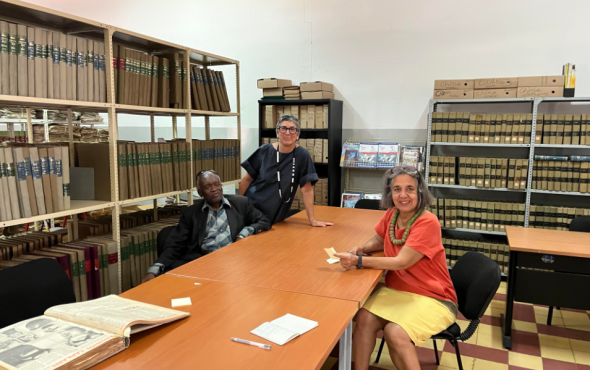Campo Experimental - Ângela Ferreira in collaboration with Alda Costa
Dear Friends
For years, I’ve had a dream of sharing an exhibition space with one of the people I’ve long collaborated with in the research space: Alda Costa - a Mozambican historian, researcher and activist friend.
The generous and unexpected invitation from Rialto6 in Lisbon - whose only requirement was that I develop an artistic project that challenged me - allowed us the privilege of imagining, all together, a plan for two exhibitions, one at the Rialto6 space in Lisbon and the other at the National Art Museum in Maputo. These two exhibitions are the result of our research into the Mozambican creative ethos and material investments in the proposed utilisation of natural resources during the first decade after independence. The curators are Paula Nascimento and Álvaro Luís Lima.
I’m delighted to invite you to join us for the opening of Experimental Field: Ângela Ferreira in collaboration with Alda Costa on Friday 26 January at 9:30 pm.
 Alda Costa, Ângela Ferreira and Alexandrino José . Arquivo Biblioteca Nacional/col.moçambicana, Maputo, October 2023
Alda Costa, Ângela Ferreira and Alexandrino José . Arquivo Biblioteca Nacional/col.moçambicana, Maputo, October 2023
Experimental Field: Ângela Ferreira, in Collaboration with Alda Costa, explores material and environmental research undertaken in the early years of Mozambique’s independence. The exhibition takes its name from an outdoor agricultural learning laboratory maintained at Eduardo Mondlane University’s campus, where university staff, researchers and students worked together to produce food, design resources, tools and structures, and train farmers and community technicians. This experimental site was coordinated by TBARN (Técnicas Básicas de Aproveitamento de Recursos Naturais), a research group formed in the early years of the socialist government to improve farmers’ production and quality of life with minimal resources.
Ângela Ferreira builds on TBARN’s visual and textual remains to reveal the revolutionary ethos that made Mozambique a global centre for radical experimentation in the 1970s and early 1980s.
The exhibition expands on Ferreira’s research-based practice and its search for the contemporaneity of the past. Experimental Field emerges from the artist’s ongoing dialogue with Alda Costa, a pioneer Mozambican art historian and cultural worker whose lived experience during socialism and scholarship thereafter have made her living memory of an unmatched moment in cultural history. In the exhibition, historical objects from Costa’s milieu and personal collection are displayed alongside Ferreira’s work. These objects’ design reveals the period’s placement of material conditions at the forefront of cultural production. Through this dialogue, Ferreira’s works investigate histories that simultaneously express political pragmatism and creative playfulness, being locally grounded and international in their reach.
In the last quarter of 2024 the exhibition travels to Mozambique. This second iteration will take place at the Museu Nacional de Arte in Maputo.


